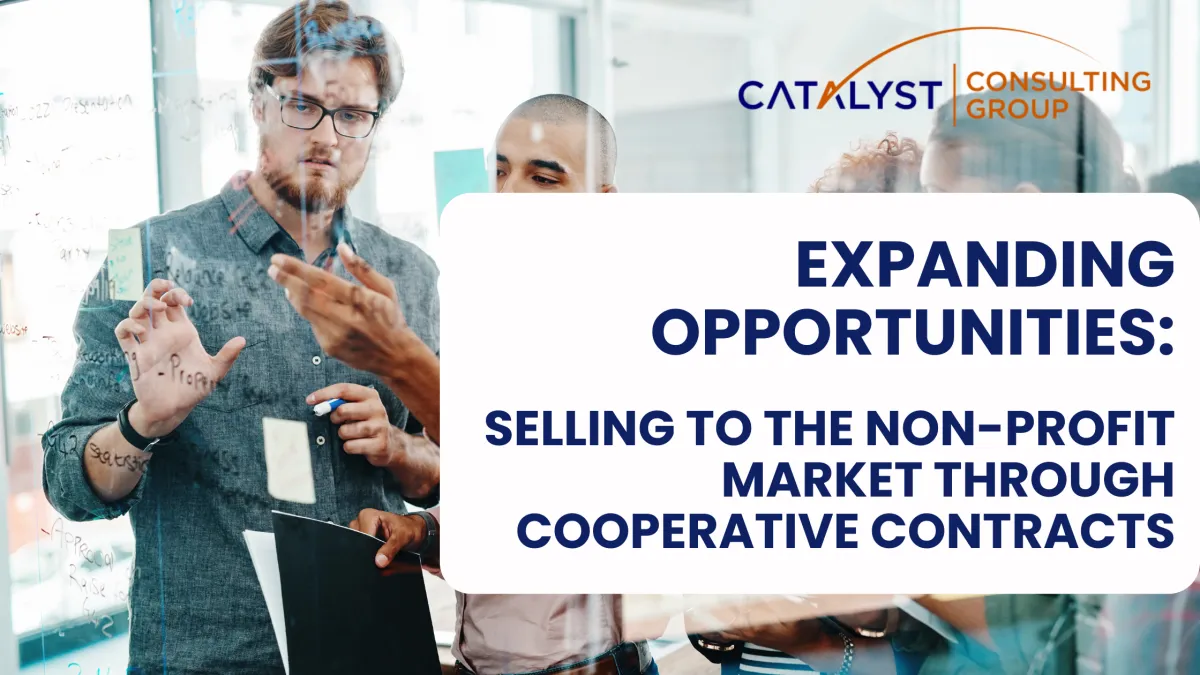
Expanding Opportunities: Selling to the Non-Profit Market Through Cooperative Contracts
This month, special guest Corey Imhoff with OMNIA Partners joined us as we dove into a critical topic for expanding your sales: selling to the non-profit market using cooperative contracts. Many organizations in this space operate on tight budgets and with lean teams, making them a prime audience for the efficiency and savings offered by cooperative contracts.
Understanding the Non-Profit Market
It's important to differentiate between non-profit and not-for-profit. While both do not distribute profits to owners, their missions and structures differ.
Non-profit organizations serve the public good. They include charities, educational institutions, religious groups, and hospitals. Revenue earned is reinvested directly into their mission. Non-profits can have paid staff and often have tax-exempt status under the IRS 501(c)(3) code, allowing them to accept tax-deductible donations.
“The definition of a non-profit is it is an organization that operates for purposes other than profit. So, that does not mean they do not make money, it just means that they use all of it.” – Michelle Warren.
Not-for-profit organizations primarily benefit their own members, not the public. Examples include sports clubs or professional associations. All funds go directly into running the organization, which may be run by volunteers.
Michelle shared that we “know that there are more than 2 million non-profits in the United States. In 2024, charitable giving exceeded $595.2 billion, so we know that those 2 million get over $595 billion a year given to them, and then they use all of that money.”
For sales teams, identifying a potential client’s tax-exempt status is crucial. You can use resources like Guidestar (also known as Candid) or the IRS website to verify an organization’s status and check their Form 990 filings, which provide insight into their financials and operations.
The Power of Cooperative Contracts for Non-Profits
Cooperative contracts are game-changers for non-profits. These contracts, which are competitively solicited on behalf of many organizations, offer a streamlined procurement process, competitive national pricing, and significant time and cost savings. Due to resource and time constraints, many non-profits, especially smaller ones, are leanly staffed with employees who wear multiple hats and may not have a dedicated purchasing department.
Corey Imhoff explained that "a lot of those bigger project-type-oriented buys are a real challenge for them." These projects can range from new HVAC systems to large furniture purchases and anything in between. Cooperative contracts help them by taking on the "heavy lifting" of the procurement process, saving them time and effort.
Using a cooperative contract also helps non-profits maintain compliance. Because many non-profits receive public funds—whether federal, state, or county—using a publicly-let contract ensures they meet the necessary purchasing requirements, including those for federal grant funding.
This means you can provide value that goes beyond the product itself—you are offering a solution that helps them be more efficient and focused on their mission.
Strategic Insights for Sales Success
To succeed in this market, you must adjust your sales approach.
Understand their mission: Unlike for-profit companies, non-profits are driven by their mission. Your sales approach should not be based on "what's the budget," but rather "how can we help you better achieve your mission".
Know the purchasing process: Understand that the purchasing process can vary. Some non-profits have dedicated procurement professionals, while others might rely on a small committee.
Leverage Key Partners: We specifically discussed OMNIA Partners as a major group purchasing organization with a strong presence and valuable contracts in the non-profit sector. Non-profits are not limited to OMNIA partners; they can purchase off other cooperative contracts as well.
Don't Miss the Next Catalyst Conversation!
Mark your calendars! Our next Catalyst Conversation is set for Wednesday, October 8th, at 4 p.m. EST. We'll be discussing the federal micro-purchase threshold and potential major changes on the horizon. We will have a special guest, a GSA trainer who is retiring at the end of September and is considered one of the best in the field. This is one you won't want to miss!
